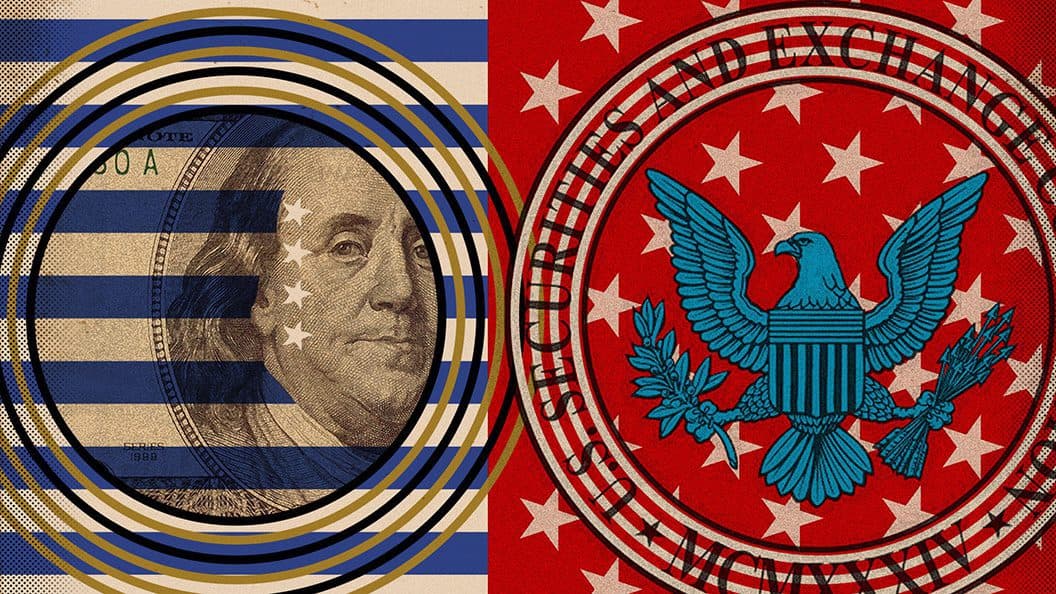Coinbase Wants a Seat at the Regulatory Table, So Does Everyone Else
Regulating crypto is a complicated issue, said Hong Fang, CEO of OKCoin, and it would be harmful to the industry if Coinbase is the only company with a voice.

Blockworks exclusive art by Axel Rangel
- In recent months, the broader crypto community has been wrestling with similar issues of how to appeal to legislators and regulators when it comes to digital assets
- Galaxy Digital’s Mike Novogratz has said that the crypto community should expect a volatile next six to 12 months as regulatory guidelines are established
After canceling plans to expand into digital asset lending following a warning from the US Securities and Exchange Commission, Coinbase has promised lawmakers and industry peers a regulatory proposal, but the rest of the cryptocurrency community might not like what they have to say.
“My two cents are that there really has to be a little bit more community participation, because Coinbase has a pretty big voice in the space, particularly when it comes to regulatory conversations,” said Hong Fang, CEO of OKcoin. “I just don’t want anything put in front of regulators that is misleading or not capturing the full picture.”
The announcement that Coinbase will write a set of regulatory rules came shortly after the SEC informed the cryptocurrency exchange that it would be sued if it moved forward with plans to launch its lending service, Lend. The SEC issued Coinbase a Wells notice, a formal statement sent to individuals or firms when an enforcement action can be expected, on September 1, according to the exchange.
“We felt the need to be a little bit more public about this and figure out what works for everyone,” said Emilie Choi, chief operating officer of Coinbase, during a virtual appearance at the Mainnet conference in September, referring to the company’s plans to release a regulatory framework to help guide lawmakers. Coinbase has not revealed any details about how the proposal will be written or if any collaborators will be involved.
Common struggles
The struggles Coinbase faces on a regulatory front are not unique, but they are one of the larger companies in the industry.
“I think Coinbase is a leader in its class in many ways,” said David Tawil, president of ProChain Capital. “At this point there’s clearly challenges for Coinbase and all of its peers in terms of regulation.”
Regulating crypto is a complicated issue, Hong said, and it would be harmful to the industry if Coinbase is the only company with a seat at the table.
“If regulators are hearing certain inputs, particularly at the federal level, and they put crypto in ‘a-one-size-fits-all’ framework, that is too premature for the industry, that ends up stifling innovation,” said Fang. “There’s a lot of experts in this space that are very much keen on contributing on this front.”
Regulation, Fang points out, is in many ways fundamentally at odds with the founding principles of cryptocurrency.
“The technology is trying to play a role in replacing what regulation is trying to, with regards to protecting customers,” she said. “You want to come up with something where you encourage the protocol-level participation and self-governance to make sure that customer protection is baked into the protocols and that there’s enough security, and then it’s really the work of math, the work of the algorithm.”
Centralized decentralization
During a recent interview on the Best Business Show podcast, Coinbase’s CEO Brian Armstrong said that if he had to build Coinbase all over again, he may consider building it as a decentralized organization, but regulatory pressures would make that difficult.
“I think if I had to do it all over again, I would lean more into some of the decentralization aspects, in the sense that we would probably just put a lot of our documentation we have internally and just make it all public and just do it out in the open,” Armstrong said. “Would I do it as a decentralized autonomous organization? The DAO tools still need to get a little more refined in the sense that you should probably have a DAO as the governing body of these organizations, but in local countries where you operate, you may actually still need a C-Corp.”
The decentralized vs. centralized debate is common in the crypto community, Tawil pointed out, given how difficult it is to operate without adhering to traditional financial guidelines.
“I’m actually not so sure that this all ends up decentralized, I really believe that there is going to be a fair amount of centralization that happens,” he said. “Frankly, if Coinbase is the centralized player, I think an even bigger player may come along and buy it to have immediate access to everything that the asset class has to offer.”
Not a seamless process
Regulation will not be a quick or seamless process, Tawil pointed out.
“There are going to be a whole host of challenges beyond the substance, there’s going to be political jockeying, there’s going to be legislative, calls for all sorts of different things, there’s going to be public interest groups that weigh in as well,” he said. “So certainly it’s not going to be smooth sailing.”
In recent months, the broader crypto community has been wrestling with similar issues of how to appeal to legislators and regulators when it comes to digital assets. Some, including Galaxy Digital CEO Mike Novogratz, feel that the industry has not done enough to help legislators understand the technology and its purpose.
“Our community did a terrible job of educating Washington on what our industry was and what’s important,” said Novogratz during a panel discussion at the same Mainnet conference. He added that the community should expect a volatile next six to 12 months as regulatory guidelines are established.






